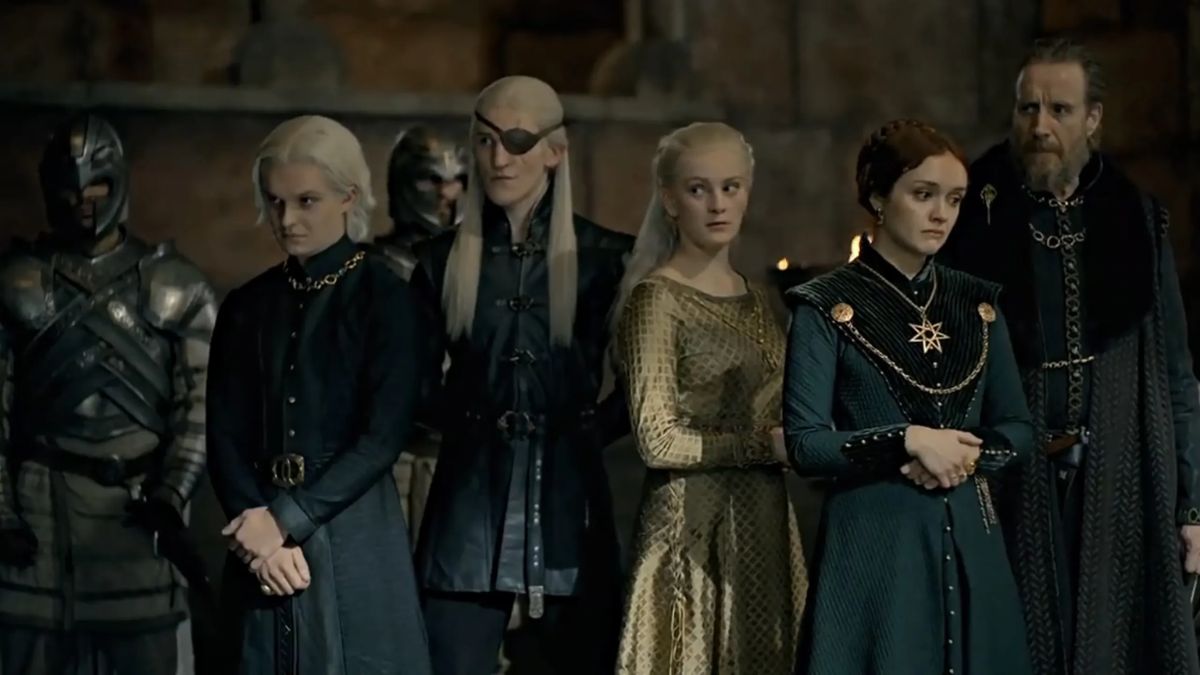One Change in ‘House of the Dragon’ Will Leave the Greens Dealing With a Textbook Example of Poetic Irony
And I would love to see it addressed!

The first episode of the second season of House of the Dragon ended with one of the most gruesome events in the entire A Song of Ice and Fire canon.
Spoilers ahead for the first episode of House of the Dragon season 2 “A Son for a Son” and for Fire & Blood, so be warned.
That’s the murder of little Prince Jaehaerys Targaryen at the hands of Blood and Cheese, a member of the City Watch and a rat catcher in the Red Keep respectively, sent by Prince Daemon Targaryen to avenge the death of Queen Rhaenyra’s son Lucerys Velaryon.
Blood and Cheese’s orders were actually to kill Prince Aemond—who was responsible for Lucerys’s death when he chased him through the sky at the end of season one, seemingly forgetting that his massive dragon had seen real battle and so wouldn’t hesitate to go in for the kill—but the two assassins can’t find the prince, and so they decide to turn to Prince Jaehaerys instead.
They do so in front of the boy’s mother, Queen Helaena, whom they force to reveal which one of her twins is the boy. The scene isn’t as gory as other scenes in Game of Thrones have been, but Phia Saban’s incredible performance really sells all the devastating tragedy of the situation—from the terrified look in her eyes as the actual murder is happening to her desperate run through the corridors of the Red Keep carrying her surviving child, Princess Jaehaera, in her arms.
Of course, an event of this magnitude is bound to have devastating consequences, including the fact that no one will longer be able to deny that the Dance needs to be fought with dragons and armies rather than with words.
Now that both sides have lost a son, they will be even more out for blood and revenge than they previously were. But there’s another consequence to the death of Prince Jaehaerys that could potentially put the Greens in front of one of the most classical examples of poetic irony—the matter of succession. And it all hinges on one change that the show made to the original Fire and Blood material.
Maelor Targaryen, the Prince That Never Was
In the Fire and Blood book, Aegon and his sister-wife Helaena actually have three children—the twins Jaehaerys and Jaehaera and then little Prince Maelor, who is four years younger than his siblings.
When the Queen and her children are ambushed by Blood and Cheese, the two assassins actually ask Helaena which one of her sons they should kill, and after much pleading she points to Maelor—her reasoning being that Maelor, who is just two years old at the time, is too little to understand what’s going on and that Jaehaerys, as the eldest, is Aegon’s heir.
In response, Blood and Cheese kill Jaehaerys, leaving Helaena to grapple with the terrible grief of losing a child and the tormenting guilt of having to face the son she had singled out to die. But this is not how things pan out in the show—because the show has no Maelor, and now that Jaehaerys is dead Aegon only has one surviving legitimate child. A girl.
The question of Princess Jaehaera
Princess Jaehaera is the only child of the King left alive, and looking at how things proceed in Fire & Blood we can’t expect Aegon and Helaena to have another one anytime soon. So that means that Aegon is now in the same perilous position that his father Viserys was in at the start of season one—his only legitimate child a girl and a warmongering brother vying for the Iron Throne.
It’s incredibly ironic, considering that the Greens’ entire claim to the throne is that it’s impossible for a woman to rule in her own right. It puts them in a delicious situation, storytelling-wise, and I hope we do get a bit of them discussing it in future episodes.
Because if Aegon declares Jaehaera his heir, then by what right is he sitting the Iron Throne that his father had meant for his half-sister, in the same way he’s now doing for his child? And if they bypass Jaehaera, then Aemond is the next in line, something that is not entirely advisable just as Daemon being heir wasn’t back in the day. Because Aemond might think he’s better suited for the throne than Aegon—and arguably he is—but that still doesn’t mean he would make a good king. Not that many Targaryens did, but that’s a whole other story of family doom.
Of course, they could still declare Jaehaera the heir and say that the situation is different than the one with Rhaenyra and Aegon—as in Jaehaera has no brothers while Rhaenyra did, and so finds herself in the only situation where a woman could inherit in her own right according to in-universe customs. But it’s an argument that could easily be picked apart by the Blacks, especially if someone were to bring up the Widow’s Law implemented by King Jaehaerys on Queen Alysanne’s suggestion.
Plus, it wouldn’t be half as interesting for us on this side of the screen as plunging the entire Green faction deep down the well of poetic irony. I for one can’t wait to see Otto Hightower try to find his way out of this one.
Have a tip we should know? tips@themarysue.com